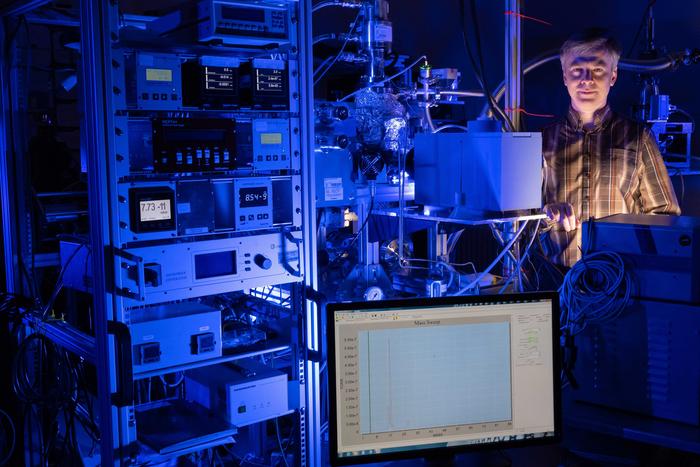Peptides are organic compounds that play a crucial role in many biological processes, for example, as enzymes. A research team led by Dr Serge Krasnokutski from the Astrophysics Laboratory at the Max Planck Institute for Astronomy at the University of Jena had already demonstrated that simple peptides can form on cosmic dust particles. However, it was previously assumed that this would not be possible if molecular ice, which covers the dust particle, contains water – which is usually the case. Now, the team, in collaboration with the University of Poitiers, France, has discovered that the presence of water molecules is not a major obstacle for the formation of peptides on such dust particles. The researchers report on their finding in the journal “Science Advances”.

Credit: Image: Jens Meyer/University of Jena
Peptides are organic compounds that play a crucial role in many biological processes, for example, as enzymes. A research team led by Dr Serge Krasnokutski from the Astrophysics Laboratory at the Max Planck Institute for Astronomy at the University of Jena had already demonstrated that simple peptides can form on cosmic dust particles. However, it was previously assumed that this would not be possible if molecular ice, which covers the dust particle, contains water – which is usually the case. Now, the team, in collaboration with the University of Poitiers, France, has discovered that the presence of water molecules is not a major obstacle for the formation of peptides on such dust particles. The researchers report on their finding in the journal “Science Advances”.
Chemistry in the Icy Vacuum
“We have replicated conditions similar to those in outer space in a vacuum chamber, also adding substances that occur in so-called molecular clouds,” explains Krasnokutski. These substances include ammonia, atomic carbon, and carbon monoxide. “Thus, all the chemical elements needed for simple peptides are present,” adds the physicist.
These raw materials, Krasnokutski describes, initially form chemical precursors to amino acids known as aminoketenes. These then combine to form chains, resulting in polypeptides. “It was previously suspected that the individual aminoketenes would bond to form peptides,” the scientist explains. “However, for this step, the absence of water might be crucial as it could hinder the reaction. At the same time, most interstellar dust particles are covered with water-containing molecular ice,” says Krasnokutski. Hence, the assumption until now has been that if peptides form in space, they do so only to a limited extent.
Precise Analysis in France
“The highly precise mass spectrometric analyses now possible at the University of Poitiers, however, showed that the presence of water in the molecular ice slows down the formation of peptides by fifty percent, but they still form,” he explains. “When you consider the time scales on which astronomical processes occur, this slowdown is practically negligible.”
The question of whether the first biomolecules on our planet are of terrestrial or extraterrestrial origin – or both – will likely remain unresolved for the foreseeable future. However, outer space as a source of our life cannot be ruled out, as this discovery indicates.
Journal
Science Advances
Method of Research
Experimental study
Article Title
Formation of extraterrestrial peptides and their derivatives
Article Publication Date
17-Apr-2024



